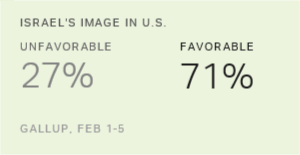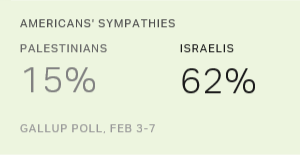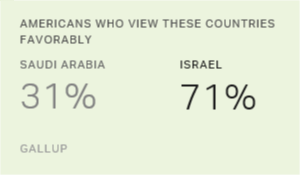Israeli police arrested several individuals close to Israeli Prime Minister Benjamin Netanyahu this week, as part of a widening investigation into allegations of corruption against him. Authorities had recommended Netanyahu's indictment on charges of bribery and corruption on Feb. 13. The allegations, which Netanyahu denies, echo past controversies.
However, before the latest allegations, his image had improved in Israel and the U.S. Further, fewer Israelis perceived widespread government corruption in their country than they did when Netanyahu took office in 2009.
Majority of Israelis approved of Netanyahu: Before the latest controversy, slightly more than half of Israelis (52%) in 2017 said they approved of the way Netanyahu was handling his job as prime minister. This is on the high side for his ratings throughout his recent tenure. His lowest approval was 35% in 2012, when Netanyahu also faced allegations of corruption.

Roughly half of Americans (49%) in 2017 said they had a favorable opinion of the Israeli prime minister. This is Netanyahu's highest favorable score in ║┌┴¤═°'s U.S. trend and is up 11 percentage points from the last measure. That was conducted in 2015, near the time of Netanyahu's controversial address to Congress attacking the U.S.-Iran nuclear agreement brokered by President Barack Obama.
Most Israelis say there is widespread corruption in their government: Three in four Israelis (76%) in 2017 said that corruption is widespread in the country's government. This is down from the 87% who believed this in 2009, when Netanyahu took office. However, it is still higher than the 56% median in 2017 across 34 member states in the Organisation for Economic Co-operation and Development (OECD). But the 72% of Americans in 2017 who said that there is widespread corruption in their country is similar to the percentage in Israel.

Takeaway: Israelis' perceptions of corruption in their country and their views of Netanyahu are not necessarily connected. His approval rating in 2017 reached majority level at the same time that three-quarters of Israelis thought government corruption in Israel was widespread. Netanyahu is the fifth Israeli prime minister since 1977 to have faced serious allegations of corruption -- and the fact that more than half of Israelis approve of the job he is doing at a time when a clear majority say government corruption is widespread suggests the situation is not unexpected in the country's politics.




